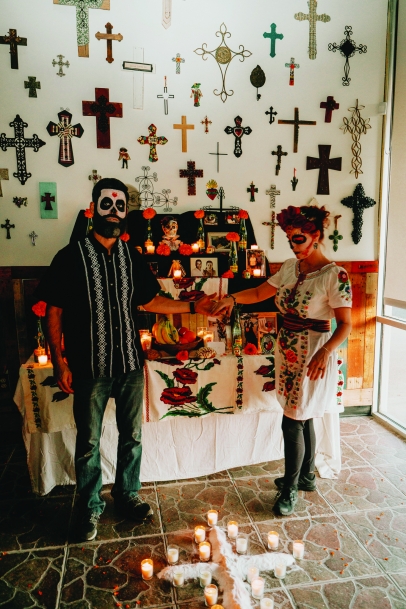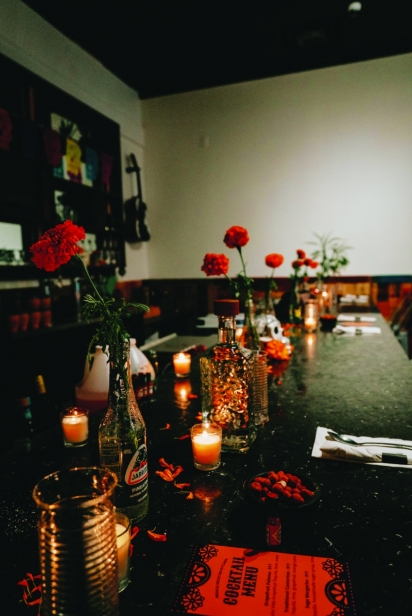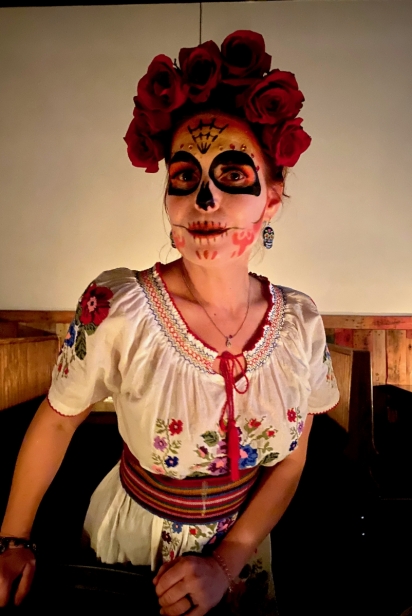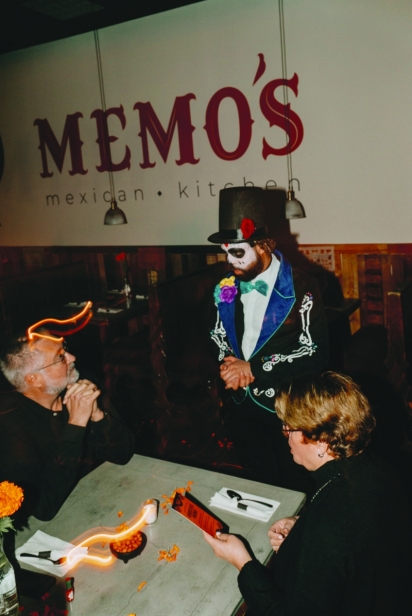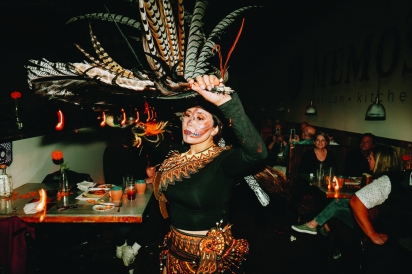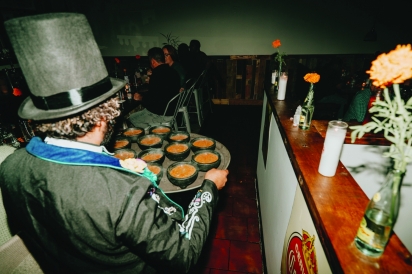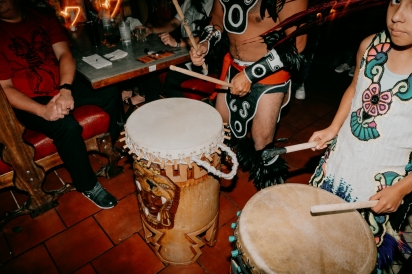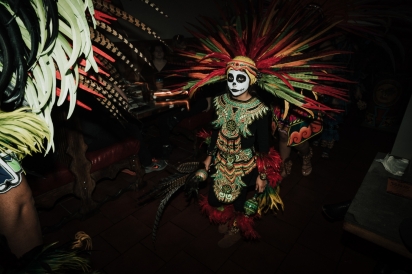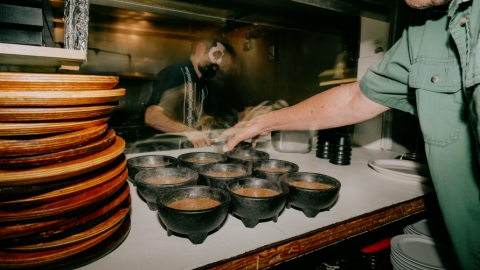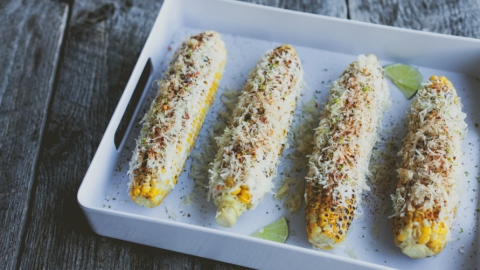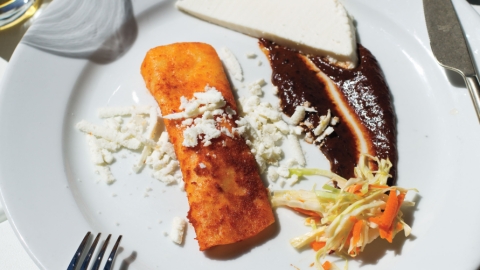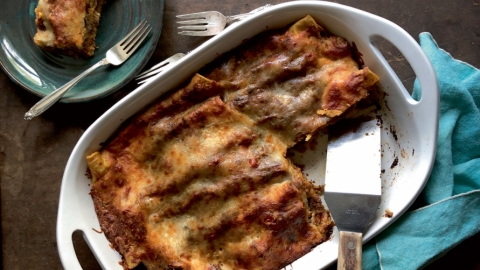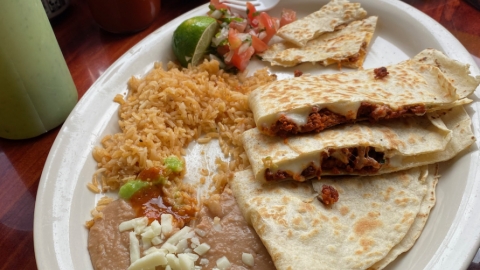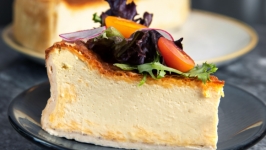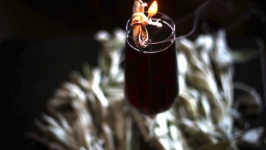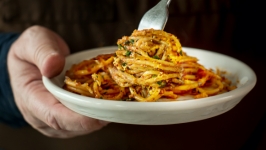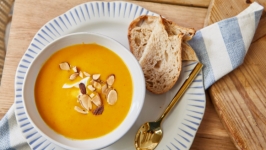Day of the Dead at Memo's Mexican Restaurant
It’s Dia de los Muertos, and Memo’s Mexican Kitchen in Mount Juliet has invited its patrons to take a break from our culture of straight lines and right angles and enter for an evening into a celebration of circles, of connections of the past to the present and the living to the dead. Crossing the threshold from a strip mall into Memo’s, you enter a candlelit, almost otherworldly restaurant, complete with an ofrenda (or alter) with the faded pictures of departed loved ones set tenderly among the traditional yellow marigolds and burning candles. Owners Katie and Memo Murillo, their faces painted as skulls with foreheads bearing curvilinear designs to symbolize grace, create their own circles; Katie at the alter, inviting with her arms the spirits of the patron’s departed loved ones to dine with the living. And Memo at the stove in the kitchen, making large swings with his arms to stir the big pots of lentils and mole; the authentic dishes from his childhood that will soon be enjoyed by all.
For Memo, food is the lifeline to the mindful cultivation of his roots. “The Day of the Dead truly has a meaning behind it,” he observes. “You celebrate your ancestors; you summon your grandparents, your great-parents; you remember where you came from. It’s about why we are here and what our ancestors did for us. It’s a true cultural celebration.” It’s also a feast, of course, and one that Memo prepares superlatively. For this Day of the Dead, we’ll dine on handmade corn enchiladas with slow cooked pork, a hearty lentil soup, and an unforgettable chicken mole composed of more than 30 spices that Memo has ground himself. If ever a meal could entice the dead to rejoin the living, this is it. But preparing authentic and irresistible dishes is not limited to the Day of the Dead, it’s simply fundamental to who Memo is. As Katie points out, Memo actually does a little dance of joy in the kitchen whenever a dish he once ate as a child is ordered. “Every time I make a dish that I remember sharing with my family, with my grandparents,” he says, “it truly makes me happy.”
A native of Yurécuaro, a small town in the state of Michoacan, Mexico, Memo is the oldest of six siblings. His father passed when he was 12, and Memo worked hard to help support his brothers and sisters, shining shoes and collecting aluminum cans, a difficult life that served to highlight the deep bonding that he enjoyed with his family at a table around great food. Close to both his grandmothers, he learned from them to cook the dishes native to the Mexican states of Jalisco and Michoacan. From his grandfather, he learned to garden, growing the beans and corn and tomatoes and peppers that he dreamed he would one day prepare and serve in his own restaurant. At 15, he migrated to the States seeking to make that dream come true. He wound up in Nashville as a dishwasher, and – blessed with his principles and his talents – worked his way up to owner-chef of Memo’s Mexican Kitchen, meeting Katie in the restaurant itself in 2012 when she was managing a nearby apartment block and came in for lunch, her own “finding Memo” moment.
Today, the couple is a dream team. Katie handles the business operations and mixes seasonal cocktails to pair with her husband’s native cooking, dishes like cochinita pibil – suckling underground pig. “By switching from crispy tacos to cochinita pibil,” Memo promises, “you are truly going to understand what Mexican food is.” The key is using annotto, an orange-red paste made from the seeds of the fruit of the achiote tree which grows in the Yucatan peninsula. “I’m going to cook it as traditional as can be,” Memo says. “In Michoacan, they make a hole in the ground and cover the pig with plantain leaves. I am also using the plantain leaves, but I am using an oven and cooking it even slower than the traditional way so it will be even more tender.”
Will cochinita pibil be on this year’s Day of the Dead’s menu? We won’t know until November 1st, but – whatever is served – we are certain that Memo’s Mexican Kitchen is the place to be to authentically experience Dia de los Muertos. “As the Day of the Dead grows more and more,” Memo says, “I think eventually it will be more important than Cinco de Mayo when you just go and get drunk and that is it. The Day of the Dead has true meaning to it.”
Memo’s Mexican Kitchen
1319 N Mt Juliet Rd, Mt. Juliet
memosmexicankitchen.com
@memosmexicankitchen


